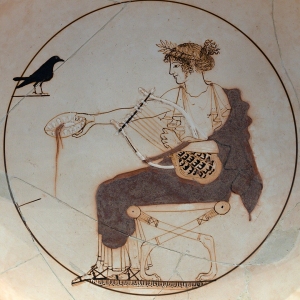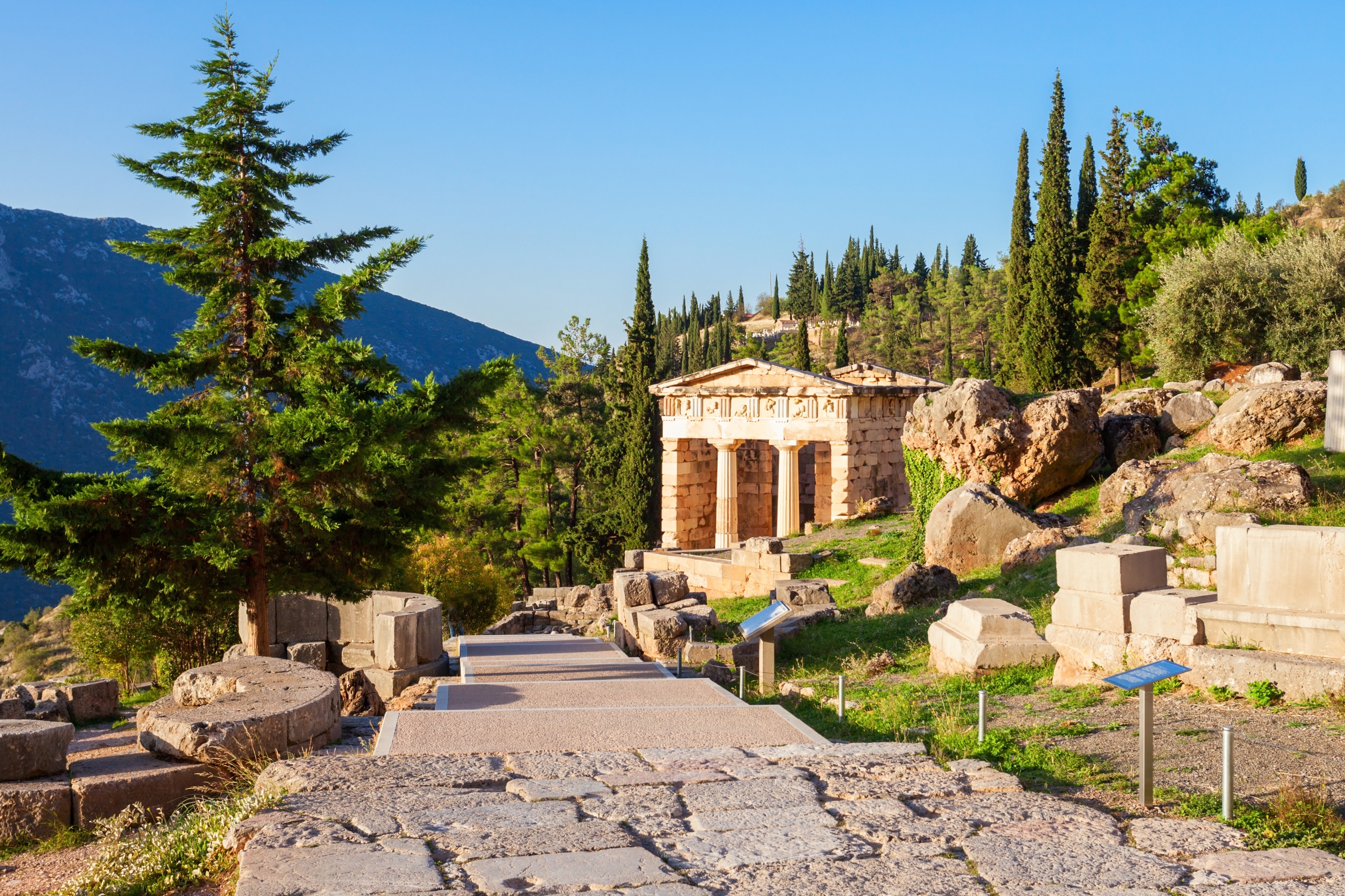On the slopes of Mount Parnassus, the Oracle of Delphi once stood as one of the most significant spiritual centers of the ancient world. Dedicated to the god Apollo, the sanctuary drew individuals and delegations from across the Mediterranean who sought wisdom. While the concept of “pilgrimage” as we know it today may be an anachronism when applied to ancient Greece, Delphi’s magnetic pull as a spiritual, cultural, and political destination mirrors many of the hallmarks of pilgrimage traditions.
The Oracle and the voice of Apollo
At the heart of Delphi was the Temple of Apollo, where the Pythia, a priestess, delivered cryptic pronouncements believed to be the words of the god himself. Seated on a tripod above a fissure in the earth, the Pythia entered a trance-like state, interpreted by priests who conveyed Apollo’s messages to those who had come seeking answers.

Individuals and state delegations approached the oracle with questions spanning personal matters, political strategies, and existential dilemmas. These queries ranged from guidance on marriage and agriculture to decisions about war, alliances, and colonization. The Pythia’s answers, often enigmatic, were revered for their divine authority, making Delphi a vital destination for both private citizens and leaders navigating complex social and political landscapes.
The journey to Delphi: A form of pilgrimage?
While ancient Greek religion lacked the formal concept of pilgrimage as seen in later traditions, the journey to Delphi bore many of its characteristics. Pilgrims (if we may use the term) traveled great distances, often enduring hardships, to reach this sacred site. Their motivations were multifaceted, combining spiritual restlessness, communal obligation, and the desire for personal or political insight.
The act of traveling to Delphi carried symbolic weight. The journey itself, often long and challenging, may have served as a form of preparation, both physical and mental, for the encounter with Apollo’s wisdom. Upon arrival, visitors purified themselves in the Castalian Spring and presented offerings –rituals that reinforced the sanctity of the experience.
For city-states, sending emissaries to consult the oracle was as much a religious act as it was a demonstration of political legitimacy. By participating in Delphi’s sacred rituals, these states affirmed their place within a shared cultural and spiritual framework that extended across the Greek-speaking world.
Famous visitors and their questions

Throughout its history, Delphi attracted some of the most influential figures of the ancient world, highlighting the site’s unparalleled authority. Socrates, for example, became a pivotal figure linked to the oracle. According to Plato, Socrates’ friend Chaerephon consulted the oracle and was told that no one was wiser than Socrates. This cryptic response deeply influenced Socrates’ philosophical mission to question and seek a deeper understanding of wisdom.
Croesus of Lydia, the famously wealthy king, also sought guidance from the oracle. He asked whether he should go to war with Persia, and the oracle’s ambiguous reply—“If you cross the river, a great empire will fall”—proved devastating, as it was his own empire that ultimately fell.
Another notable figure, Themistocles, turned to Delphi during the Persian Wars. The oracle advised the Athenian general to rely on “wooden walls.” Themistocles interpreted this as a reference to Athens’ navy, which led to their decisive victory at the Battle of Salamis.These visits highlight the oracle’s dual role as both a spiritual guide and an influential force in the geopolitical affairs of the ancient world.
Delphi as a destination for the Greek world
Delphi’s significance went beyond the Pythia’s pronouncements. The sanctuary was a pan-Hellenic center, attracting visitors from all over the Mediterranean. The Sacred Way, the path leading to the Temple of Apollo, was lined with treasuries, statues, and monuments donated by city-states and individuals in gratitude for Apollo’s guidance. These offerings were acts of devotion and declarations of prestige, illustrating the interconnectedness of religion, culture, and politics in ancient Greece.
The site also hosted the Pythian Games, a major festival held every four years in honor of Apollo. These games, which featured athletic contests, musical performances, and poetic competitions, further elevated Delphi’s status as a hub of cultural exchange and communal celebration. For many attendees, the journey to the games was as much a spiritual experience as it was a cultural one, blending worship with the joy of shared traditions.
Pilgrimage and the search for meaning
Whether or not the ancient Greeks conceptualized their journeys to Delphi as pilgrimages in the modern sense, the site fulfilled many of the same functions. It provided a space where individuals and communities could seek clarity, express devotion, and connect with something greater than themselves. The act of traveling to such a revered site reinforced the belief that divine wisdom could be accessed through human effort and ritual.
Delphi’s unique position as the omphalos, or navel of the world, added to its allure. For those who made the journey, standing before Apollo’s temple and walking the Sacred Way likely evoked a sense of awe and transformation—a connection to the divine that transcended daily life.
The legacy of Delphi
The Oracle of Delphi remained influential until the 4th century CE, when pagan practices were suppressed under Christian rule. Yet, its legacy endures as one of the ancient world’s most iconic sacred sites. Today, visitors to Delphi can walk the same paths as the ancient visitors, marveling at the ruins that once hosted profound questions and cryptic answers.
While the exact nature of ancient Greek spirituality may differ from later religious traditions, the journeys to Delphi reveal a shared human desire for guidance, transformation, and connection with the divine. In its time, the oracle was more than a destination; it was a bridge between the mortal and the eternal, a place where seekers embarked on journeys to better understand their place in the world.
Delphi, then, may be seen as an ancient precursor to pilgrimage, embodying the timeless impulse to seek wisdom and meaning in the presence of the sacred.





